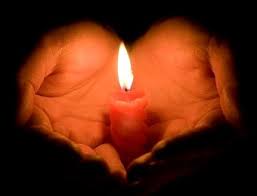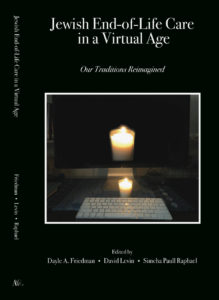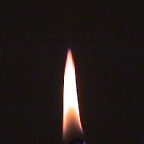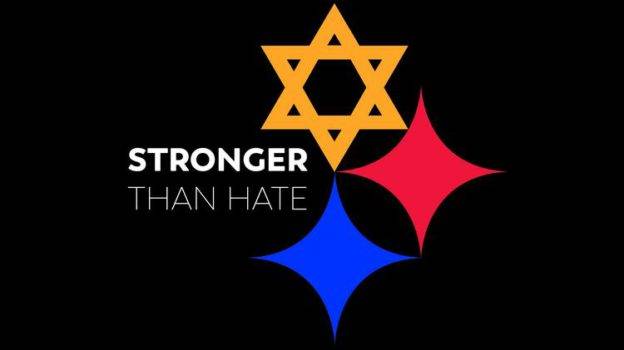Category: Mourning
Acharei Mot- How do we help people move forward?
Acharei Mot
God’s Miracle is not in the thunder and lightning but in people sheltering others from the storm. ~The Radmal
Our recent Hineini Mission to help Ukrainian refugees in Poland gave me a new perspective on Parshah Acharei Mot, teaching me how to help people move forward in the wake of catastrophe. Acharei Mot opens with God telling Moses to instruct his brother. Moses serves as the compassionate human connection so that Aaron can serve as the High Priest of the community, the children of Israel. For those of us watching the Ukraine tragedy unfold, we play the part of Moses, and the refugees are in the role of Aaron. We are like the loving brother who carries the message of moving forward and offering caring support. Helping the mothers and the children is our role.
The Parshah opens with God directing Moses, after the death of Aaron’s two sons, to tell Aaron to abide by the detailed instructions to follow. Moses shares what Aaron must do to fulfill his responsibilities as the High Priest. Many interpret this as a way to get Aaron’s full attention lest he suffers the same fate as his sons. But there is more here than that. Moses brings humanity to the otherwise stark directives and comforts his brother by serving as the carrier of the message. As a result, Aaron can begin to focus on how to move forward with his life so brutally and irreversibly changed by the death of his sons.
Aaron’s loss is a harrowing event. We witness similar excruciating anguish in the war on Ukraine. The brutality of the country’s destruction; the torture and murder of its civilians, including the elderly, babies, and children; the depravity of routinized rape and torture practiced by the Russian invaders are staggering. In our time in Krakow and at the border, we witnessed women and children coming to Poland to escape the horrors of this war, seeking asylum and leaving everything behind, including their men left to defend the homeland, knowing they too might be slaughtered. Such is the Ukrainian reality. These women and children refugees are like Aaron.
Aaron receives specific instructions on doing his job as the High Priest. These continued instructions coming after the deaths of Nadav and Abihu tell Aaron, and us too, that life must continue even after a catastrophe. Responsibilities to the children do not cease because of personal loss, even the most challenging kind. Our work and our lives remain in front of us. We must move forward. But it is almost impossible to do that alone.
Moving forward is complicated and often overwhelming. Moreover, the loss brings a sense of isolation. Aloneness makes us feel cut off from the community, from life itself. But Moses’ presence informs Aaron that he is not alone. And the instructions Moses carries help Aaron move forward.
Moses informs Aaron that he may enter the Shrine only with a specific offering, and he must appear dressed appropriately. In other words, moving forward is deliberate, done with forethought and intention. It requires structure and resolution and others to help you through the fog of loss.
We support our brothers and sisters of Ukraine. In our rabbinic mission to help the Ukrainians, we brought needed supplies to heal the physical needs and our presence as rabbis to heal the emotional and spiritual needs. We did this sacred work with the support of our communities and congregations. But the task is barely begun. The people of Ukraine continue to need everything- food, shelter, clothing, and a place to make their forever changed lives. After death, life must continue, but only with the help of us, their loving brothers and sisters, will the victims find a path forward. May this be our continued mission.
God’s Miracle is not in the thunder and lightning but in people sheltering others from the storm. ~The Radmal
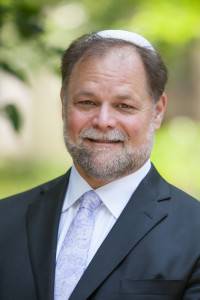 Rabbi David Levin focuses on bringing Jewish wisdom to seekers of meaning. He is the Founder and Director of Jewish Relationships Initiative, a 501(c)3 focused on human relationships, end-of-life challenges, and outreach. Rabbi Levin’s teachings include “The Ethical Legacy Will, Jewish Wisdom Reimagined“- a new approach to the Ethical Will, “Gleanings of a Wandering Jew,” the lessons of our history and personal travel, “Kavod v’Nichum, Understanding Jewish end-of-life rituals,” exploring the ‘why’ underlying our practice,” Resilience” a mash-up of Jewish Wisdom and Disaster Spiritual Care training.
Rabbi David Levin focuses on bringing Jewish wisdom to seekers of meaning. He is the Founder and Director of Jewish Relationships Initiative, a 501(c)3 focused on human relationships, end-of-life challenges, and outreach. Rabbi Levin’s teachings include “The Ethical Legacy Will, Jewish Wisdom Reimagined“- a new approach to the Ethical Will, “Gleanings of a Wandering Jew,” the lessons of our history and personal travel, “Kavod v’Nichum, Understanding Jewish end-of-life rituals,” exploring the ‘why’ underlying our practice,” Resilience” a mash-up of Jewish Wisdom and Disaster Spiritual Care training.
Rabbi Levin is the co-editor of the acclaimed book Jewish End-of-Life Care in a Virtual Age: Our Traditions Reimagined.
What is the right way to mourn?
In Judaism, it is pretty straightforward. We have a series of rituals and traditions that serve to guide us. But the answer is more nuanced depending in considerable measure on who you are and the relationship to the deceased.
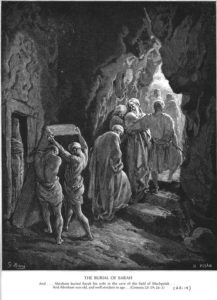 Judaism compels us to “do the right thing.” It is one of our tradition’s great insights. Doing what we are supposed to do is affirming the bereaved’s humanity and sense of ethics. Even if the relationship was fraught, Judaism provides the ability to rise above circumstances instead of becoming a victim to circumstances.
Judaism compels us to “do the right thing.” It is one of our tradition’s great insights. Doing what we are supposed to do is affirming the bereaved’s humanity and sense of ethics. Even if the relationship was fraught, Judaism provides the ability to rise above circumstances instead of becoming a victim to circumstances.
In this week’s Torah portion, Chayei Sarah, we read that when Sarah died, Abraham wept (Genesis 23:2). But as is the case with Torah, there is more here than the words of the verse. The Torah has one of the letters of the Hebrew word for wept, livkotah, the kaf, printed physically smaller than the other letters. Our sages saw this as purposeful and concluded that this indicated that Abraham cried only a little. Why would Abraham not weep fully?
Perhaps he was overcome by guilt, bearing responsibility for her death. Midrashim tell of Sarah dying of a broken heart when she learns Abraham took their precious son Isaac and sacrificed to God on Mount Moriah. And to further compound things, Abraham knows in his heart that he would do the same thing again to prove his loyalty to God.
There are many reasons why we are unable to be fully present when we experience loss.
For example, Abraham negotiated for the burial cave and immediately focused on sending his servant to find a wife for Isaac. Most of us have experience with people focusing on funeral planning as a means of diversion from confronting the pain of loss. And many people experience complicated grief or ambivalence over the death of someone ostensibly close.
Our tradition offers us a roadmap of sorts when for the process of death and grief. My teacher Rabbi Dr. Michael Chernick wrote that we have obligations and responsibilities as the surviving loved one. Whether we loved them or even liked them, whether they were good to us or not, for our own sake, we need to do certain things on behalf of those who die. So we learned that despite Abraham’s weeping, or lack thereof, he purchased the cave at Machpelah and buried Sarah there.
As a rabbi, I am often asked how do I bury my loved one correctly? The fact that someone would ask means that, on some level, they already are. Together we can explore ways to help them.
But that is different from dictating what to do or how to feel. We have a framework. The task is to understand how our tradition can provide the honor of the deceased and comfort for the bereaved.
Recently, two adult children asked me to officiate the unveiling for their father. Then they changed their minds, cavalierly saying that as only a couple of prayers need to be spoken, they could do it without the expense of a rabbi in attendance. Besides, he (their father) never would have won father of the year.
As I listened, I knew that they would honor their father, but I also knew they were about to miss out on that crucial second piece of our tradition’s wisdom, finding their comfort. We spent some time talking as I was wearing my chaplain’s kippah. But I didn’t press. I hoped they might process the unveiling and the loss in a constructive way and bring them comfort and healing.
How do you process complicated grief? Abraham demonstrates that the question has been around for a long time. So may we find comfort in our memories of those deceased as we embrace the idea that they may be for us a blessing.
Shabbat Shalom
The close of Kaddish is Oseh Shalom. Elan Jagoda leads the Songleader Boot Camp community in this beautiful melody.
“May the One who brings peace on High bring peace to us all.”
On this Shabbat, may all those in need of comfort find peace.
Shabbat Shalom
Jewish End Of Life Care In A Virtual Age: Our Traditions Reimagined
Excited to share that our new book is now available on Kindle and in paperback!
To Mom, Zichronah Livracha- a toast with Chocolate Milk
 A small gathering of family said goodbye to the matriarch this past Sunday. Adult children and wives, adult grandchildren, and a “bun in the oven.” I was asked to officiate because that is what the family believed mom would have wanted. They and their mother understood themselves in a humanist way, but they believed it was the appropriate honor for mom- to bury her Jewishly. The boys never had a chance to have this conversation with her as she had dementia that ravaged her by the end.
A small gathering of family said goodbye to the matriarch this past Sunday. Adult children and wives, adult grandchildren, and a “bun in the oven.” I was asked to officiate because that is what the family believed mom would have wanted. They and their mother understood themselves in a humanist way, but they believed it was the appropriate honor for mom- to bury her Jewishly. The boys never had a chance to have this conversation with her as she had dementia that ravaged her by the end.
I did my best to honor her and those who were trying to honor their mother by weaving rituals with stories that each family member was eager to share and reluctant to stop. This beautiful family time ended by raising a glass of chocolate milk, mom’s favorite drink, toasting her life and the family that is her legacy.
As I was preparing to leave, the sons presented me with the replica Torah Scrolls given to each of them by the rabbi from their Bar Mitzvah. They found them among the few possessions mom brought with her to the care facility.
May her life be for a blessing.
Remembering Pittsburgh- Stronger than Hate
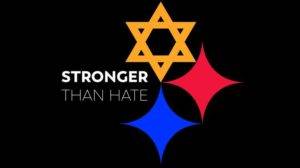 The tragic murder of 11 people one year ago in Pittsburgh is a harsh reminder that hatred is real and we are not always in control of events. Things often happen to us. As painful, hurtful, or even devastating as something can be, how we react is in our control. What is the life-lesson that we learn and how do we actively embrace that life lesson going forward?
The tragic murder of 11 people one year ago in Pittsburgh is a harsh reminder that hatred is real and we are not always in control of events. Things often happen to us. As painful, hurtful, or even devastating as something can be, how we react is in our control. What is the life-lesson that we learn and how do we actively embrace that life lesson going forward?
Do we react cynically or with an open, albeit wounded, heart? Can we forgive? Will this event haunt us holding us back, or compel us to move onward? What is the vision of the future we see that is shaped by what happened, what is the world we want to see, and how will we get there?
I struggle with an anger and pain that could be overwhelming, especially as one of the Rabbis initially deploying to Pittsburgh with the Red Cross in the immediate aftermath of the shooting. Our Jewish tradition helps me re-center myself. Here I can embrace the timeless values that understand the human condition and provide a framework for a just society where we all might live in peace, based on the idea that we should treat our neighbors as ourselves. But it is a hard climb up to that mountaintop.
This is the challenge of Pittsburgh. Our hearts ache for those lost as a result of violent Anti-Semitism. We take solace in the love of our neighbors and find strength standing shoulder to shoulder with other people of goodwill to continue to strive for the kind of just society we want America to be.
Our tradition is one of deeds. Our response to this tragedy needs to be more than a feeling. There are many ways to respond through civic involvement and community activism. Judaism requires that we belong to a community committed to promoting our values be it a synagogue, philanthropy, or civil rights group. The important thing is that you are compelled to respond with actions to live the values of our tradition and to build a better world. What will you do?
Zichronam Livracha and Shabbat Shalom.
In Remembrance
Shabbat Zachor Shalom
In the wake of yet another inhuman tragedy, we stand in silence and solidarity mourning lives senselessly taken in the name of hate and pray this Shabbat that we may someday find peace and wholeness.
Shabbat Shalom
Sacred Work in Pittsburgh
 I have just returned from a deployment to Pittsburgh with the American Red Cross.
I have just returned from a deployment to Pittsburgh with the American Red Cross.
For any of my colleagues who have experienced grief, the trauma experienced by the Pittsburgh Jewish community is similar, but orders of magnitude larger. Despite all of the wonderful Jewish institutions that make up the community, Federation, JFCS, the JCC, and all the synagogues, the event was bigger and more catastrophic than anyone could have imagined would happen in 2018. The American Red Cross (ARC) stepped in to help as it does in all disasters and I was called upon to join in the effort.
I joined the Disaster Spiritual Care Team of ARC as a volunteer watching their work in the aftermath of Hurricane Harvey. As a rabbi, I believe this is important and sacred work, and I needed to be part of the team that did that. So, when the call came to assist my own people in the wake of this unspeakable horror, I knew I had to go.
For the Pittsburgh massacre, Rabbis were selected because of the Red Cross’ desire to work with the Jewish community; we know the “language” and are the people to help in creating a liaison, bridging more effectively to the community to share the wealth of services offered with those in need. We focused on communications with institutions and then reaching out to individuals as was possible. It is impossible for two rabbis to care for a community of almost 50,000, so we worked to create connections. It was also clear that we needed to support the rabbis and others who were desperately trying to serve their people while struggling themselves to find strength and succor. Much of the healing work that needs to be done won’t be accurately assessed for some time. As others have noted, this past week we have been sprinting at the beginning of a marathon. And furthermore, the nightmare and the work of healing goes far beyond the Jewish community, all of Pittsburgh suffered this trauma
I was there to help bury people, say Kaddish, attend services and vigils and do what I could, as meager as that sometimes seemed. I held people and I cried (a lot), but mostly I was just present- an empathetic embrace to those in awful anguish and pain to let them know they were not alone in their time of extraordinary grief.
There are multiple levels to this event, like ripples from a stone hitting the water. The families, the congregations, the Jewish Community, the people of Pittsburgh, Jews across the country and the people of America, each has been touched by these murders in Pittsburgh. Each community needs to understand how it has been impacted and how we relate to the others who have also been impacted. It is complicated and it will take time.
The Jewish Community came together. The denominational differences that often separate us were set aside. Funeral services were packed to overflowing as were Friday and Saturday services. And so importantly, we were not alone.
I was heartened to see the greater Pittsburgh community response to this tragedy. The outpouring of love, the sharing of the horror, clearly said to me that the Jews of Pittsburgh are part of the community of Pittsburgh and the community is appalled by this horrible thing perpetrated on a part of it. This sense of unity is an extraordinary and wonderful counter-response to the feelings of isolation or the existential threats that members of the Jewish community may be feeling.
Many others from other faith traditions joined us. For example, I spent time with a family of the Bruderhof tradition (an Anabaptist denomination) who I met at a funeral service held in the Reform Temple Rodeph Shalom and again at the Shabbat morning services held at the Conservative Synagogue Beth Shalom. They were there to be with us. I found some comfort in expressing my deep appreciation for their presence and helping them to understand our siddur, the readings from Torah and Haftarah, and some of the common themes of our faith traditions.
The Moslem community raised hundreds of thousands of dollars for the Victim’s fund. They also offered to create a physical wall of people to surround synagogues in a show of solidarity and protection. All faith traditions joined with us in solidarity as this was an assault against all of us. Our common humanity brought us all together. It was an inspiring message of hope and love.
Rabbi Jeffrey Myers has been remarkably eloquent speaking to the community with important messages as a witness to the horror and as one who has been harshly criticized by some for his welcoming of the President to Tree of Life Synagogue. Rabbi Myers taught in his D’var Torah this past Saturday that if he was to truly practice the values we preach, he was obligated to respectfully welcome the President of the United States into his Jewish home. This also gave Rabbi Myers the opportunity to directly state to the President the need for him to stop the hate speech.
In the midst of it all, the Kiddush after Shabbat services was used to share Sheva Brachot, the recitation of blessings to a wedding couple. For one of the extraordinary Pittsburg rabbis and his wife were just married. We sang the blessings and then everyone burst out in Od Yeshama and we started to dance. Watching my two new friends lead the community in joy and celebration of the hope represented by their marriage brought all of us to our feet. Her unbridled exuberance made all of the pain disappear for a short while. I cried as I clapped and sang as hard as I could.
People are quick to explain why this happened offering ideas that are more pronouncements rather than thoughtful quiet dispassionate analysis. I suggest that it is premature to try to address the question why. It is deeply layered and complex and we are still in the midst of the acute trauma making such conversation and inquiry too highly charged and all but impossible. Instead, as a thoughtful colleague in Pittsburgh suggested, we might instead look towards the question how. How do we move forward in the aftermath is a question that will yield more pragmatic answers that will help those struggling to get through. We will do better to engage in those conversations for now.
The people of Pittsburgh are strong and resilient. But they are hurting badly and deeply. In the name of Klal Yisrael and as fellow Americans, we have an obligation to be there for Pittsburgh’s Jews as the immediacy of the trauma and shock wears off and the struggle to heal begins. We are forever changed by this. May we learn constructive lessons so that those lost as true martyrs in the Jewish tradition will not have died in vain. May their memories be for a blessing.

